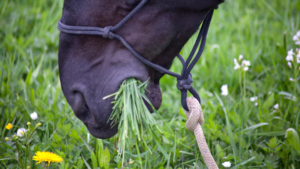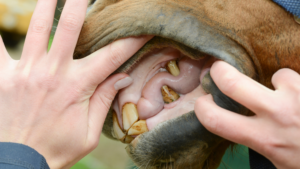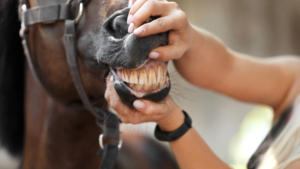Horses are grazing animals, dependent on their teeth to deliver nutrition. Horses have hypsodont teeth (meaning: “high-tooth”) because of their very long teeth. These teeth continually erupt as the horse ages and grinds their teeth down as they chew. Dental problems and oral pain can result in behavioral issues and poor performance. Regular dental exams and floating can minimize and eliminate many dental issues in your horse.
Horse Teeth Anatomy
First things first: let’s take a look at the anatomy of horse teeth (see the diagram below).
What Kind of Teeth Do Horses Have?
Horses have between 36-40 permanent teeth made up of incisors, canines, wolf teeth, and cheek teeth. Horses have 6 upper and 6 lower incisors located at the front, designed to grasp and tear grass. Next, canine teeth rest between the incisors and cheek teeth. Mares are less likely to have canine teeth than stallions or geldings. These teeth erupt around 4-5 years of age and were meant for fighting. The remaining teeth are known as Cheek Teeth (these include molars and pre-molars). These teeth are designed to grind grasses. These teeth continue to erupt as the horse ages to make up for the wear from grinding.
How do Horses Chew (Masticate)?
Horses masticate or chew by grasping with their incisors and then moving the food back to the cheek teeth. The horse will then grind the feed between the upper and lower teeth in a circular side-to-side motion. This grinding motion is what ultimately wears down the teeth.
How Horse’s Teeth Grow
Horses are born with a full set of adult and deciduous (baby) teeth. Deciduous incisors will often erupt in foals before they are born, with the last teeth erupting at about 8 months old. Slowly these teeth will fall out and be replaced by adult teeth. Most horses will finish losing their baby cheek teeth caps between 2.5-4.5 years old. Generally horses will have all of their permanent teeth in by age 5.
What Are Wolf Teeth, and Do I Need to Remove Them?
Wolf teeth are small teeth located in front of the first upper cheek teeth. Not every horse will have wolf teeth and are thought to be a previously molarized tooth that is slowly disappearing with the evolution of the horse. Wolf teeth generally erupt between 6-18 months of age and will vary from horse to horse. Generally, wolf teeth are not an issue. Historically, wolf teeth were routinely removed because they were thought to be a potential cause of biting issues.
However, sometimes wolf teeth are placed within the horse’s mouth so they prevent proper chewing. In this instance, they should be removed. Removing wolf teeth can be simple or challenging depending on where they are located in the horse’s mouth. An experienced equine dentist or veterinarian should be consulted if you believe your horse’s wolf teeth need to be removed.
Do Old Horses Lose Their Teeth?
Older horses can lose teeth as they begin to taper in size due to age. If a horse loses a tooth, the opposing tooth will have nothing to grind on which can create other issues. Proper dental care and routine floats can help reduce any resulting issues from lost teeth.
Do Horses Feel Pain in Their Teeth?
Horses can feel pain in their mouths and teeth just like humans. Oral discomfort for horses presents in many different ways and should be monitored for. Aggressive behavior, head shaking, poor performance, quidding, and weight loss are common indicators of oral pain and discomfort in horses.
How to Keep Horse Teeth Healthy
A horse’s teeth play a huge role in their overall well-being, because it affects not only how they are able to receive nutrients, but also their comfort level when using a bit. Read on to find out how to support your horse’s dental care.
Does my Horse Need a Dentist?
While wild horses seem to be fine without routine dental care, domesticated horses have altered feed patterns, limited grazing, and are asked to perform. When you combine all of these elements, routine dental care becomes an essential part of keeping horses healthy. Issues with teeth can lead to weight loss, pain, and performance issues from oral discomfort. For older horses, routine dental can help to preserve grinding ability and comfort longer.
What is Horse Teeth Floating?
Floating is the process of removing sharp points and edges from the cheek teeth in a horse. A speculum is placed in the horse’s mouth to allow the dentist to thoroughly examine the teeth and keep the mouth open while they are working.
The dentist will be looking for any issues, including broken teeth, sharp points, or missing teeth. During the float, they will rasp the horse’s teeth to remove sharp points and even out the teeth. Most horses are very tolerant of this, but some do need sedation.
Tools Used by Equine Dentists
Floating can be done by hand with rasps or with a motorized dental float. Motorized floats can be very effective for experienced dentists or veterinarians. Speculums are also used during the procedure. Some dentists have small lights that attach directly to the speculum for easier viewing.
How Often Do Horses Need Their Teeth Floated?
Most normal horses need a dental examination and float once per year to stay comfortable and balanced. Horses with a history of dental issues, abnormal growth, or missing teeth may benefit from an examination twice per year to proactively address any new issues. In older horses, it is important to preserve the grinding surface, and they often just need an exam rather than a float.
It is important to monitor for dental issues. Common signs that a horse is in need of dental work include:
- Dropping feed, difficulty chewing
- Losing weight
- Head tilting, bit chewing, resisting bridle
- Poor performance
- Bad breath
- Swelling around the face or jaw
Some horses will exhibit signs of pain from dental issues while others will not. It is important to create an awareness of your horse’s normal behavior and take note when something is different.
Can I Float My Horse’s Teeth?
While it can be tempting to save money on a dentist or veterinarian trip, dental floats should only be performed by licensed and experienced professionals. Significant damage can be caused very quickly by inexperienced people attempting to do a dental. However, horse owners should make routine teeth examinations part of their care routine. Early identification of sharp points and edges can prevent further damage to your horse’s mouth.
What Teeth Can Tell You About a Horse
“Long in the tooth” is an age-old expression based on evaluating a horse’s teeth, because they have indicators about their age, habits, and possible health issues.
Age
Horses were commonly aged using their teeth, and some still are. There are several features of teeth that can be associated with a certain age. The general consensus is this method of aging a horse becomes less and less accurate after the horse passes 10 years of age. Once they reach this age, it is very challenging to determine an exact age accurately.
Deciduous teeth are generally replaced by adult teeth by age 5 for most horses. Permanent teeth have a concave surface appearance, combined with the angle of the teeth, overall shape, and a groove on the outer surface (Galyvane’s groove), which continues to grow out are all indicators used to help determine age.
How Can You Tell if a Horse Has Good or Bad Teeth?
Horses with “good teeth” have a balanced, comfortable mouth. Most horses will require some level of dental work throughout their lives, so this should not be an indicator of “bad teeth”. In addition to behavior changes, a horse with bad teeth could have misalignment, uneven bit planes or wave mouths (more on that later), missing teeth, gum disease, broken teeth, or excessively worn teeth.
Some horses will have teeth that erupt abnormally, resulting in a parrot-mouthed horse (overbite). This issue rarely causes discomfort, but often results in a misalignment of the teeth. Cheek teeth are designed to wear on the opposing tooth. If there is a misalignment, the horse will require regular dental care to prevent overgrown teeth and sharp hooks from forming.
Quidding and Cribbing – Should I Be Worried?
Quidding is a common result of mouth pain and discomfort in horses. Horses will drop partially chewed balls of food on the ground (quids) when they are having difficulty chewing because of sharp points of uneven bite planes. If you notice balls of food on the ground, you should contact a dentist or veterinarian and schedule an exam.
Cribbing is a bit different. Cribbing is when a horse bites and chews on an object, generally wood. This is most commonly associated with boredom for most horses. However, if this is a significant change in your horse’s behavior you might consider a dental exam in case.
Types of Tooth Ailments in Horses
There are a number of tooth issues in horses.
Fractured Teeth: Fractured teeth are often the result of chewing on a weak tooth. These are not uncommon and generally do not cause issues.
Gum Disease: Occasionally horses will have gaps between teeth and food becomes trapped. This trapped food causes an infection, gum disease, and sometimes tooth loss.
Sharp points: Sharp points are very common in horses and generally form on cheek teeth. These points can cause painful cheek and tongue lacerations.
Retained caps: This occurs when deciduous (baby) teeth do not fall out. These can be removed by a dentist or veterinarian.
Hooks: Hooks can form on the front upper cheek teeth making the circular side-to-side chewing motion difficult.
Wave Mouth: Wave mouth is a series of tall and short teeth in one row of cheek teeth. This can be caused by uneven wearing from lost teeth or soft teeth.
Step Mouth: Step mouth is when one cheek tooth is longer than others. This generally occurs when the opposite tooth is missing and there is no opposing tooth grinding the surface down of the other tooth.
Shear Mouth: Shear mouth is when the grinding surface of the cheek teeth is severely sloped with one edge being much higher than the other. This makes chewing very difficult for the horse and needs to be corrected.
FAQ’s
- Do horses get different sets of teeth?
Horses are born with a full set of deciduous (baby) teeth and a full set of permanent adult teeth.
- Do horses have a full set of teeth?
Horses have between 36-40 permanent adult teeth which include incisors, canines, wolf teeth (occasionally), and cheek teeth.
- Can a horse survive without teeth?
Horses can survive without teeth with proper care and diet. However, there are severe limitations and challenges for horses without teeth.
- Can a horse bite your finger off?
A horse’s teeth are not designed to bite off a finger. However, they have very powerful jaws and could break a finger, though it is rare.
- Why does a horse quid?
Quidding is generally the result of a dental issue, either sharp points, hooks, or misalignment.
- Why do horses show their teeth?
Sometimes horses will show their teeth when they encounter an unusual smell. If there are no new smells, this may be a sign of aggression or agitation.
- Can you ride a horse after it’s had its teeth done?
Most dentists and veterinarians recommend giving a day off after a dental float. If the horse requires a more extensive float, consult your veterinarian on the appropriate recovery time.
- How often do horses need their teeth checked?
Horses with no history of dental issues should have an annual dental exam. If the horse has known dental issues, these examinations should be more frequent.
- Do horses need their teeth brushed?
Horses do not need their teeth brushed. Horses are herbivores and their diet creates an alkaline environment that is not conducive to widespread decay.
Equine Dental Health is an Essential Piece of Overall Health
Proper dental care and routine examinations will keep your horse comfortable and healthy. Early identification of oral issues can help prevent behavior changes, weight loss, and loss of performance ability. Scheduling an annual dental examination with your spring vaccinations is a great way to discover and address any dental issues.











